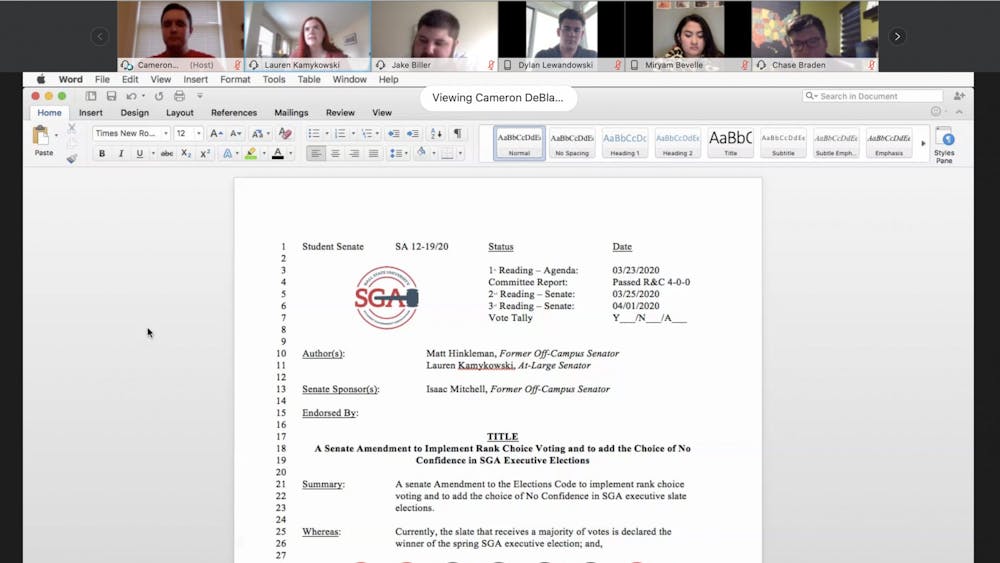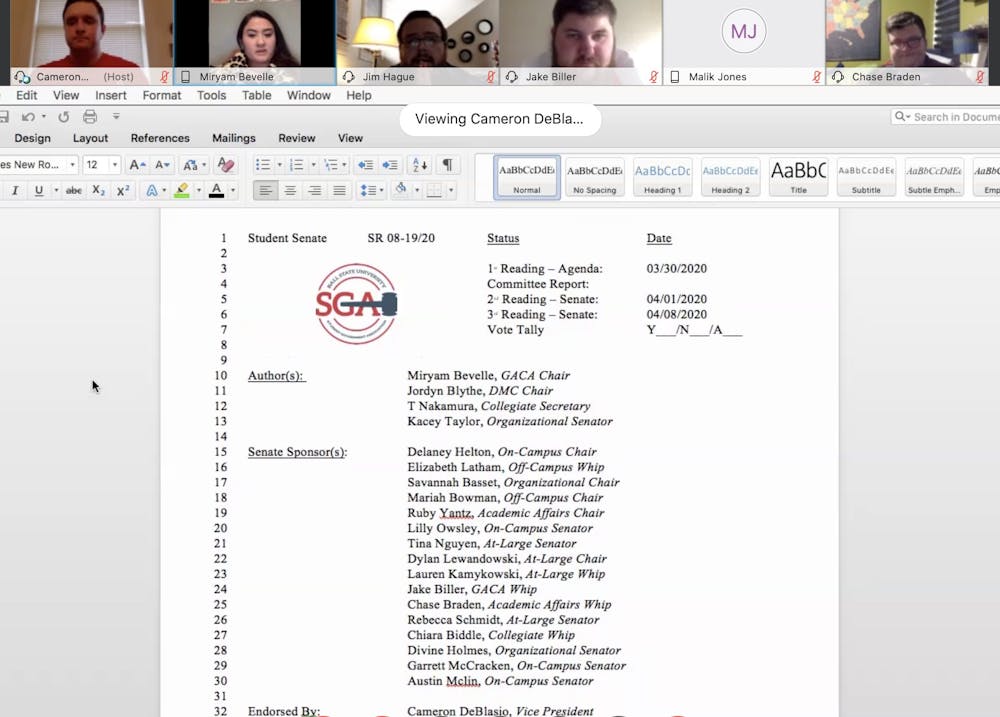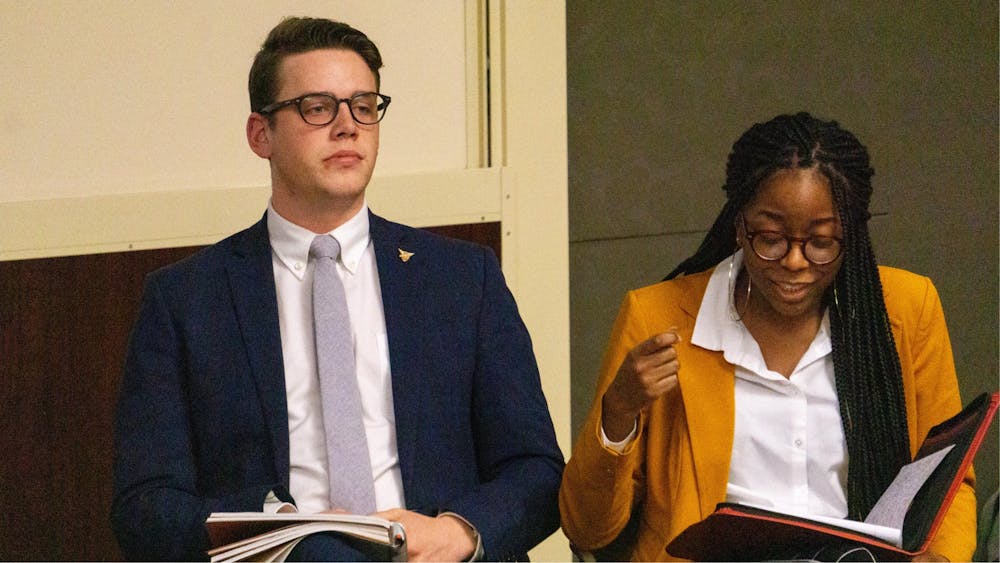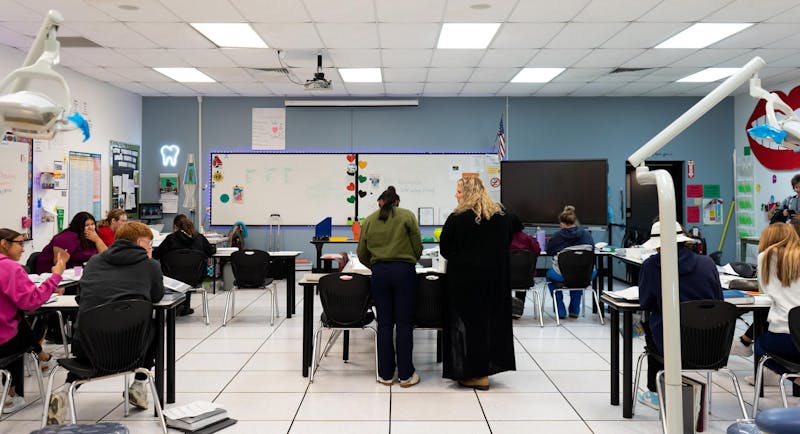Ball State’s Student Government Association (SGA) passed an amendment Wednesday to implement rank choice voting and add the choice of a no-confidence vote in future SGA executive slate elections.
The amendment, which passed 19-7 with two abstentions, will implement a voting system for students to rank their preferred executive slate if three or more slates run. This reduces the chances of having a second round of voting like the past two elections.
“The reapportionment of votes that happens under a ranked choice system is essentially what happens with a double-ballot process,” amendment author Lauren Kamykowski said last week.
If students only want to vote for one slate and do not want to rank the other two, Kamykowski said the legislation provides an option for students to do that.
“Since the amendment has officially passed in the senate, I see it transforming our governing documents in the included ways in the amendment, and leading to the ultimate implementation of ranked choice voting,” she said.

Senators vote on the amendment to implement rank choice voting in the event three or more executive slates run. Lauren Kamykowski said multiple governing documents will have to be updated, but rank choice voting will begin in the 2021 election. Grace McCormick, Screenshot Capture
Implicit Bias Training:
Senators Miryam Bevelle and Jordyn Blythe introduced a resolution that would require Ball State faculty to attend implicit bias training.
Blythe said they spoke with Vice President for Inclusive Excellence Marsha McGriff about implementing bias training before writing the legislation.
“[Ball State’s Inclusive Excellence Plan] is what [McGriff] pointed me toward to reference,” Blythe said. “I asked her about implementing the training and that’s why we tied it to the plan.”
The legislation addresses two goals of the Inclusive Excellence Plan regarding recruitment and training.
The resolution quotes the plan’s goals to recruit a diverse staff and to “provide training opportunities and experiences for the campus and community focused on handling diversity.”
Though the resolution was inspired by the SGA and Black Student Association (BSA) town hall event after the classroom incident involving marketing professor Shaheen Borna and student Sultan “Mufasa” Benson, Bevelle said the resolution is not only for professors.
RELATED: Ball State BSA, SGA host community forum following classroom incident
“We definitely want to extend the required implicit bias training to all faculty and staff, even custodial or dining employees, because they all interact with students as well.” Bevelle said. “Having the proper skillset to recognize and handle implicit bias should be implemented for all faculty and staff alike.”
SGA advisor Jim Hague said he completed two implicit bias trainings as a Ball State employee in the Office of Student Life, but Bevelle and Blythe want to extend the training to all offices.
“Let’s use these specific [Inclusive Excellence Plan] goals to strengthen our initiative and tell the university that they need to work on these particular goals right away, with student input in mind,” Bevelle said.
Bevelle said she is confident the resolution will pass in the SGA senate. It will be voted on next week in a Cisco’s Webex virtual meeting.
Apart from the rank choice amendment, the senate also voted on the four other amendments introduced last week using Microsoft Outlook voting forms that President Pro Tempore Carter Gallagher linked in the Webex chat.

Senators read a resolution that would require University staff members to complete implicit bias training. Jordyn Blythe said some student sponsors of the legislation have experienced discrimination on Ball State's campus. Grace McCormick, Screenshot Capture
Last meeting’s amendments:
The Senate also discussed the amendment “Organizational Caucus Expansion” that would allow an unlimited number of organizations to apply for representation in the organizational caucus.
RELATED: Ball State SGA introduces five amendments, cancels in-person inauguration
In the April 1 meeting, Bevelle made an amendment to Dylan Lewandowski’s legislation that changed “Any number of additional seats may be filled by unprotected organizations” to “8 additional seats may be filled by unprotected organizations,” doubling the current allotment of unprotected seats.
“Through the discussion, I realized we would have to find a happy medium … my overall goal is to make sure that every student feels that they have an equal opportunity to be represented in SGA,” Lewandowski said. “But I also understand a lot of senators were worried about there being a large jump in the number of senators in the organizational caucus.”
Lewandowski’s amendment passed 18-9 with two abstentions — exactly the two-thirds majority needed to pass an amendment, Lewandowski said he was not concerned with the narrow vote.
“We had a handful of senators not present today, three of whom were sponsors. With their votes, we would have had an 80 percent passing rate, which I think is just fine,” he said.
Lewandowski’s amendment to change standing committee expectations and allow hosting an event or conducting research to fulfill the requirement for writing legislation each semester passed 27-0.
Chase Braden’s amendment to require all parliamentarians to have at least one semester’s experience in Ball State SGA passed 20-1.
Finishing voting on last week’s business, Braden and Ruby Yantz’ amendment to update the responsibilities of the academic affairs committee passed 22-1 with one abstention.
Additional amendments:
Also in the meeting, an additional two amendments were introduced.
Blythe and Gina Espisito introduced an amendment that would require senators to visit at least two university organizations per semester. The visit obligations would not affect the two volunteer hours required of senators.
“There is a communication disconnect between Student Government Association and Ball State student organizations,” the legislation states. “More awareness about Student Government Association and greater transparency with fellow student organizations could be gained through this process.”
Senators opted not to discuss this amendment in today’s meeting.
Finally, an amendment to change the name of the secretary executive position to “Chief Administrator” in all governing documents was introduced by Espisito and Jake Biller.
“The role of the Secretary position goes beyond recording notes during weekly Senate meetings,” the amendment states. “The Secretary position on Executive slates often involves administrative tasks working with the University administration and Student Senate.”
If passed, this amendment would take effect after the inauguration of the Bold slate.
Bold’s inauguration will be co-hosted on Webex by Hague and SGA Vice President Cameron DeBlasio and Hague April 15. All senators will be invited to the Webex meeting and the meeting will be recorded for senators and other students who would like to watch later.
Contact Grace McCormick with comments at grmccormick@bsu.edu or on Twitter @graceMc564.





The Daily News welcomes thoughtful discussion on all of our stories, but please keep comments civil and on-topic. Read our full guidelines here.